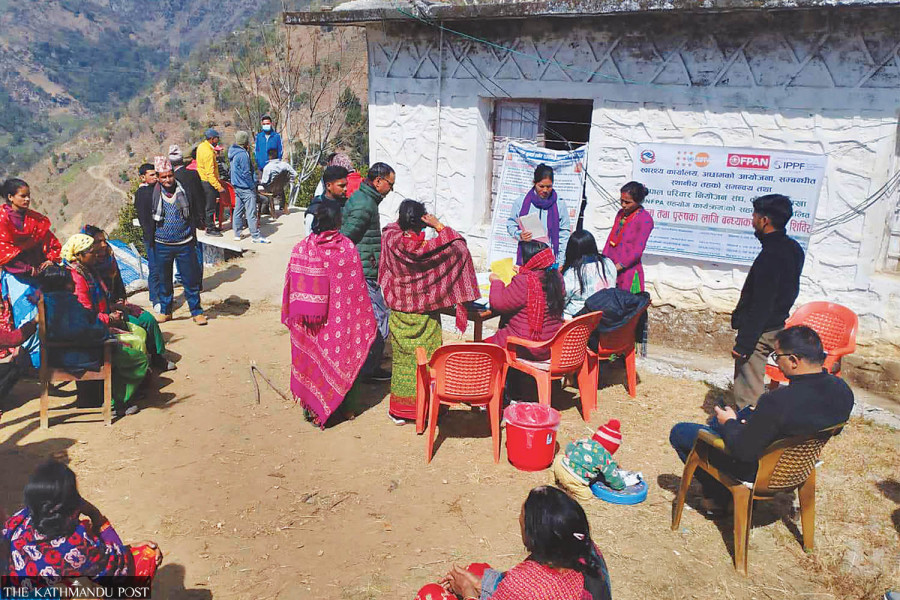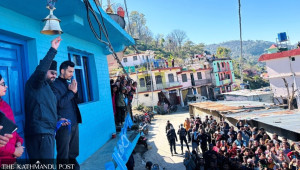Sudurpaschim Province
Rural women deprived of reproductive health rights
At recent health camps in Achham, fewer people chose permanent family planning. Patriarchal attitudes and preference for sons blamed as root causes.
Menuka Dhungana
A 35-year-old woman from Panchadewal Binayak Municipality in Achham, a hill district in Sudurpaschim Province, made up her mind to undergo minilaparotomy during a family planning camp organised in Binayak a few days ago. She wanted permanent contraception as she already has four daughters and a son. She gave birth to a baby boy after four daughters.
“We wanted a son and finally we have one. I personally thought that it would be difficult to raise children if I gave birth to the sixth baby. So I told my husband about my plan to undergo the minilap procedure. But my husband categorically opposed the plan and even threatened to marry another woman if I went ahead,” said the woman. “Due to the husband’s threat I could not receive the service although it was available in our village.”
Another woman from ward 6 of Ramaroshan Rural Municipality also wanted to undergo minilap procedure at the mobile family planning camp. The 33-year-old man with two daughters and a son does not want to have another child. But she gave up her plan due to tremendous pressure from her husband and in-laws.
“I talked to my husband, who is currently in Mumbai for work, over the telephone. I needed his consent to undergo minilap. But he scolded me why I wanted the family planning service when he was in Mumbai. He threatened to marry another woman if I got the service. Then I gave up my plan,” said the woman.
A 26-year-old woman, a mother of a daughter and a son, from ward 5 of Mangalsen Municipality had to revolt to receive the minilap service from the mobile family planning camp organised last week. She ekes out a living as a daily wage worker. She is worried about the future of her two children. According to her, she had four abortions over the past few years. So the camp was an opportunity for the woman from an impoverished community. But her husband prevented her from receiving the permanent contraceptive service.
“I have become weak as the husband often drinks alcohol and tortures me physically and mentally. My condition further worsened as I had to abort pregnancies time and again. I decided to undergo the minilap procedure despite the husband’s objection. But my father-in-law and mother-in-law supported my decision. My husband also showed up at the camp when I was admitted there, to stop me. He attempted to beat me up, but he could not as there were other people as well,” she shared her ordeal. “I had to revolt for the permanent contraceptive. Fearing my husband's attack, I am now living at my maternal home.”
The District Health Office in Achham organised a family planning camp in four different places—Panchadewal Binayak, Mangalsen, Ramaroshan and Mellekh—in the district from February 23 to 27. Many women, as mentioned above, wanted to undergo the minilap procedure but could not. They were pressured by their husbands and in-laws against undergoing a permanent contraceptive procedure.
The number of people receiving permanent contraceptives during the recent family planning camp is quite less. Only 53 people underwent the minilap and vasectomy procedures. And the number of men choosing permanent family planning is less than half of the number of females.
As per the data available at the District Health Office, a total of 36 women and 17 men underwent minilap and vasectomy procedures during the recent camp organised in the district. “There were far more women who wanted to receive service from the camp. But they could not get the service due to family pressures and threats from their husbands,” said Jhanak Dhungana, chief at the health office.
Article 38, Clause 2 of the constitution states that every woman shall have the right to safe motherhood and reproductive health. However, many rural women in the country are denied access to these fundamental rights.
“The women are deprived of the right of reproductive health mainly due to patriarchal attitudes and desire to have a son at any cost. Families pressure women to produce children. Male members have total control over family planning decisions and the number of children,” said Pashupati Kunwar, Achham-based women's rights activist.




 10.12°C Kathmandu
10.12°C Kathmandu















